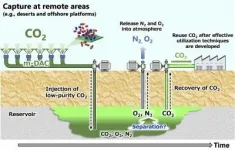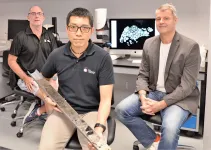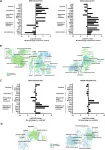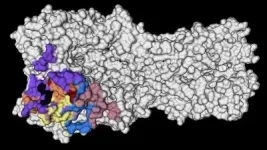(Press-News.org) ROCHESTER, Minn. -- A study by Mayo Clinic researchers provides some clarity in the use of direct oral anticoagulants (DOAC), such as apixaban and rivaroxaban, to treat acute venous thromboembolism (VTE) in patients with gastrointestinal cancers. The findings were published Wednesday, June 2, in Mayo Clinic Proceedings.
Among the study's findings:
Rivaroxaban showed no higher risk of bleeding in luminal gastrointestinal cancer and should not be considered contraindicated in this group of patients.
Apixaban showed a higher risk of bleeding in patients with luminal gastrointestinal cancer, and it should be used with great caution to treat this type of cancer until more studies are available to establish its safety.
Direct oral anticoagulants can be used in patients with venous thromboembolism and nonluminal gastrointestinal cancers, such as pancreatic cancer and hepatobiliary cancer. This is similar to the way patients with nongastrointestinal cancers are treated for venous thromboembolism.
"It is well known that nearly 1 in 5 patients with cancer will develop a clot in the veins, referred to as either a deep vein thrombosis or pulmonary embolism," says Waldemar Wysokinski, M.D., Ph.D., a Mayo Clinic cardiologist. "Clotting events can be deadly, with pulmonary embolism being the second most common cause of death in cancer patients."
Dr. Wysokinski says patients with cancer who are treated with anticoagulants for venous thromboembolism have a higher risk of a new clot formation and bleeding, and every anticoagulant should be specifically checked for its effectiveness and safety in this group of patients.
"In the past, the front-line treatment for VTE in patients with cancer was low molecular weight heparin, or LMWH, injected via syringe," says Dr. Wysokinski. "However, between 2018 and 2020, three new anticoagulants ? edoxaban, rivaroxaban and apixaban ? previously approved by the FDA (Food and Drug Administration) for VTE treatment were specifically evaluated in patients with cancer-associated VTE and found to be noninferior to LMWH, specifically dalteparin."
Dr. Wysokinski says that in the randomized clinical trial with rivaroxaban, a safety analysis of patients treated with this blood thinner identified four major bleeding events that occurred among 11 patients, or 36% of patients, whose cancers were located in the upper portion of the gastrointestinal tract ? esophagus or esophagus-stomach junction ? compared to one major bleeding event in 19 patients, or 11% of patients, treated with low molecular weight heparin. This observation resulted in excluding patients with this type of cancer from further enrollment in this trial.
Dr. Wysokinski says that a retrospective analysis of patients with gastrointestinal cancer enrolled in a study comparing efficacy and safety of another direct oral anticoagulant ? edoxaban ? to low molecular weight heparin showed a nearly fourfold higher risk of major bleeding in patients treated with this blood thinner, compared to patients treated with low molecular weight heparin.
"These two observations prompted changes in medical guidelines recommending against using DOACs such as rivaroxaban or edoxaban in patients with GI cancer in favor of LMWH," says Dr. Wysokinski. "We felt that these recommendations were based on a very small number of patients and that the findings would require further evaluation to define if restrictions on the use of DOACs applied to all blood thinner of this category ? and to the whole group of patients with GI cancers or only to patients with luminal GI cancers."
Dr. Wysokinski says at the time his team completed its analysis and submitted their study for publication, there were no studies of patients with cancer-associated venous thromboembolism that compared apixaban to low molecular weight heparin in a subgroup of patients with gastrointestinal cancer. He says that while the current study showed no higher risk of bleeding in patients with luminal gastrointestinal cancer treated with rivaroxaban, there was a higher risk of bleeding in patients treated with apixaban.
"Our study does not support the observations of previous clinical trials of rivaroxaban, but it does raise concerns regarding the use of apixaban in this type of cancer and indicates the need for further studies to establish its safety," says Dr. Wysokinski.
INFORMATION:
About Mayo Clinic
Mayo Clinic is a nonprofit organization committed to innovation in clinical practice, education and research, and providing compassion, expertise and answers to everyone who needs healing. Visit the Mayo Clinic News Network for additional Mayo Clinic news. For information on COVID-19, including Mayo Clinic's Coronavirus Map tracking tool, which has 14-day forecasting on COVID-19 trends, visit the Mayo Clinic COVID-19 Resource Center.
Media contact:
Joe Dangor, Mayo Clinic Public Affairs, 507-284-5005, newsbureau@mayo.edu
WOODS HOLE, Mass. -- Plastics are everywhere. From cell phones to pens and cars to medical devices, the modern world is full of plastic-- and plastic waste. New research from scientists at the Marine Biological Laboratory (MBL) END ...
A team led by UC Riverside engineers has developed a catalyst to remove a dangerous chemical from water on Earth that could also make Martian soil safer for agriculture and help produce oxygen for human Mars explorers.
Perchlorate, a negative ion consisting of one chlorine atom bonded to four oxygen atoms, occurs naturally in some soils on Earth, and is especially abundant in Martian soil. As a powerful oxidizer, perchlorate is also manufactured and used in solid rocket fuel, fireworks, munitions, airbag initiators for vehicles, matches and signal flares. It is a byproduct in some disinfectants ...
Fukuoka, Japan - The global threat of ongoing climate change has one principal cause: carbon that was buried underground in the form of fossil fuels is being removed and released into the atmosphere in the form of carbon dioxide (CO2). One promising approach to addressing this problem is carbon capture and storage: using technology to take CO2 out of the atmosphere to return it underground.
In a new study published in Greenhouse Gases Science and Technology, researchers from Kyushu University and the National Institute of Advanced Industrial Science and Technology, Japan, investigated geological storage of low-purity CO2 mixed with nitrogen (N2) and oxygen (O2), produced by direct air capture (DAC) using membrane-based technology.
Many current ...
Climate scientists at the Nanyang Technological University, Singapore (NTU, Singapore) have extended the known record of Singapore's sea-level to almost 10,000 years ago, providing a more robust dataset to aid future predictions of sea-level rise.
One of the main challenges in researching climate change is to reconstruct its history over thousands of years. To have a better sense of the potential causes and effects of future changes, scientists need to learn from and understand the past.
Extracting ancient sediments from a depth of up to 40 m underground at a site at Singapore's Marina South, an international team led by NTU researchers put the samples through rigorous laboratory ...
Bottom Line: The majority of surveyed Americans had an inadequate understanding of palliative care, and frequency of health care utilization was one determinant of knowledge.
Journal in Which the Study was Published: Cancer Epidemiology, Biomarkers & Prevention, a journal of the American Association for Cancer Research
Author: Motolani Ogunsanya, PhD, an assistant professor at The University of Oklahoma Health Sciences Center
Background: Palliative care aims to improve the quality of life for patients and caretakers by addressing the physical, psychological, and logistical challenges associated with a disease or its treatment. In contrast to hospice, which provides comfort care for patients who have stopped treatment and are near the end of life, palliative care serves as an ...
Oncotarget published "Characterization of the inflammatory microenvironment and hepatic macrophage subsets in experimental hepatocellular carcinoma models" which reported that HCC typically develops on a background of chronic inflammation and fibrosis with tumor associated macrophages playing an important role in chronic inflammation-induced HCC and progression.
However, the liver harbors unique macrophages, resident liver Kupffer cells and monocyte-derived macrophages, and their contribution to HCC and to the population of TAMs is incompletely known.
Here, the authors characterized the tumor microenvironment and the proportion and transcriptional profile of ...
A growing number of people use they/them pronouns to signal their gender identity, but for many people, use of "they" to refer to a single individual takes some getting used to.
Results of a recent END ...
Lauren Dreier was paging through a 19th century book by the German architect Gottfried Semper when she spotted some intriguing patterns inspired by lace. A professional artist and designer who often incorporates technology into her work, Dreier, who is also a doctoral student at the School of Architecture at Princeton University, decided to recreate the printed illustrations in 3D.
She grabbed ribbon-like plastic material she had been experimenting with in her studio, bending and connecting the semi-rigid strips. To Dreier's surprise, the structure she built assumed a bumpy geometry, with four distinct hills and valleys. "I thought it would make a dome, but it was this unusual shape," Dreier said. Curious to know what caused ...
A new study from the University of Chicago and Scripps Research Institute shows that during the last great pandemic--2009's H1N1 influenza pandemic--people developed strong, effective immune responses to stable, conserved parts of the virus. This suggests a strategy for developing universal flu vaccines that are designed to generate those same responses, instead of targeting parts of the virus that tend to evolve rapidly and require a new vaccine every year.
Influenza is an elusive and frustrating target for vaccines. There are two main types of flu virus that can infect humans, which evolve rapidly from season to season. ...
Neurological and psychiatric symptoms such as fatigue and depression are common among people with Covid-19 and may be just as likely in people with mild cases, according to a new review study led by a UCL researcher.
By reviewing evidence from 215 studies of Covid-19, the meta-analysis published in the Journal of Neurology, Neurosurgery and Psychiatry reports a wide range of ways that Covid-19 can affect mental health and the brain.
Lead author Dr Jonathan Rogers (UCL Psychiatry and South London and Maudsley NHS Foundation Trust) said: "We had expected that neurological and psychiatric symptoms would be ...




